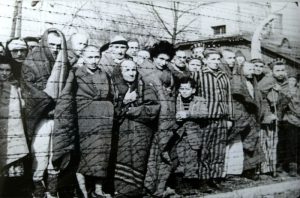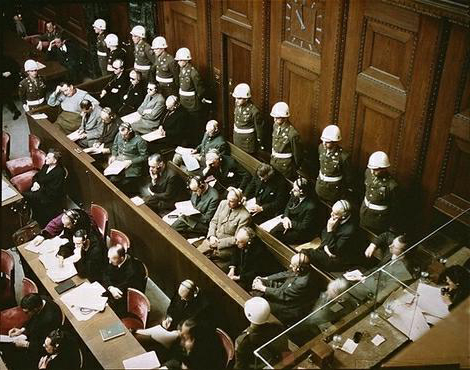By Madaline George
Today, January 27th, marks the 70th anniversary of the liberation of Auschwitz. It was designated International Day of Commemoration in memory of the victims of the Holocaust by the UN General Assembly Resolution 60/7 on November 1, 2005.
Some 300 survivors met at Auschwitz for a ceremony marking the occasion and urged the world against a repeat of the crimes they endured – speaking directly against the anti-Semitism and other hate crimes which have increased in number over the past year, and in particular the last month, across Europe and in other parts of the world.
It is estimated that about one million Jews were systematically killed in the camp by the gas chambers, starvation or disease; other victims were Roma (Gypsies), disabled persons, homosexuals, dissidents, non-Jewish Poles and Soviet prisoners.

Auschwitz Liberated January 1945
Speakers of parliament from 29 countries across the European Union gathered in Prague today and issued a declaration against anti-Semitism and hate crimes. The Declaration called for a “threefold approach” focused on “education, legislation and enforcement of laws against hate crimes.” It also advocated for the “establishment of an inter-parliamentarian Working Group to draft legal proposals strengthening tolerance and combating various forms of hatred and incitement to hatred.” The final declaration was signed by all parliamentary leaders present except for Turkey.
The International Holocaust Remembrance Alliance (IHRA), with 31 member countries, eight observer countries and seven permanent international partners, issued a statement to commemorate the liberation. In it the countries reaffirm their commitment to Holocaust education, research and remembrance while also recognizing “that antisemitism, xenophobia and genocide are not confined to the past but continue to be real threats.” The countries declared their commitment to “remembering and honouring [the Holocaust’s] victims, to upholding the terrible truth of the Holocaust, to standing up against those who distort or deny it and to combatting antisemitism, racism and prejudice against the Roma and Sinti. We are determined to continue to develop our international cooperation on Holocaust education, remembrance and research and the prevention of future genocides.” The Declaration also reaffirmed their commitment to the Stockholm Holocaust Declaration signed 15 years ago by leaders and officials from more than forty countries.
The international response to the war crimes committed during World War II included the establishment of the Nuremberg international tribunal, created pursuant to the London Agreement. The London Agreement described four crimes for which German leaders would be tried. The first count involved conspiracy to engage in the other three. The second count was “crimes against the peace’ – the planning, preparation and waging of an aggressive war. The third count was “war crimes” – a broader category including murder, wanton destruction of cities, deportation of civilian population and mistreatment of soldiers and civilians. The final count was “Crimes Against Humanity” – a new concept of inhuman actions committed against civilians and the category that contained the crime of mass murder of Jews.
This Nuremberg Tribunal tried 22 individuals, rather than governments. It has been heralded for championing the idea that “[c]rimes against international law are committed by men, not by abstract entities, and only by punishing individuals who commit such crimes can the provisions of international law be enforced.” (Heller, The Nuremberg Military Tribunals and the Origins of International Criminal Law).

Defendants at the Nuremberg Trials
The Nuremberg Tribunals greatly contributed to the development of international criminal law, influencing The Genocide Convention of 1948, The Universal Declaration of Human Rights in 1948, The Nuremberg Principles in 1950, The Convention on the Abolition of the Statute of Limitations on War Crimes and Crimes against Humanity in 1968, and the 1949 Geneva Conventions and their Additional Protocols. The Nuremberg Tribunal is also credited with initiating the movement which led to the creation of the ad hoc tribunals and eventually the world’s first permanent International Criminal Court.
